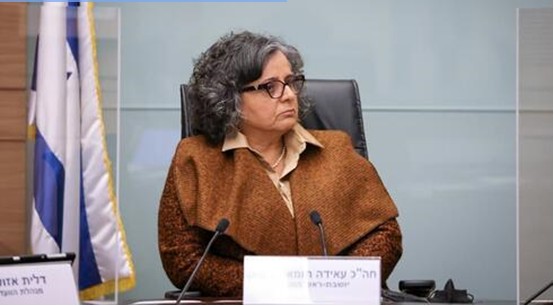“Israeli working women still earn less than their male counterparts in both public and private sector,” said Hadash MK Aida Touma-Sliman (Joint List), who heads the Knesset’s Committee on the Status of Women, according a new report published Tuesday. The annual Van Leer Institute’s Gender Inequality Index in Israel find that there are still worrying discrimination between men and women in Israel in a wide range of aspects, including work positions, pay, as well as political power.

Hadash MK Aida Touma-Sliman (Joint List), head of the Knesset’s Committee on the Status of Women (Photo: Knesset)
The report adds that in the last six years there has been no significant change in the percentage of women holding senior positions in the public or private sectors, while there is no indication of narrowing gaps between the genders. Among other things, the index also shows a significant pay gap between men – whose average monthly salary stands at NIS 13,095 – and women – whose monthly salaries average NIS 8,954.
“Efforts made to reduce gender gaps fail to reduce overall inequality,” said Hadas Ben Eliyahu, Director of the Yoda’at knowledge Center on Women and Gender, as well as one of the researchers who complied the index. “COVID-19 further exacerbated these the gaps, and we fear that by 2022 the level of inequality in Israel will be even higher,” said Ben Eliyahu, who added that the biggest and most worrying is the gap in the country’s centers of political and economic power. “We see in every field that there is a minority of women at the decision-making table, and we understand that the issues that concern women are not represented in centers of influence in any field,” she added.
The Committee on the Status of Women in the Knesset is set to convene on next weeks to discuss the report, which points to the rampant, continuous and seemingly growing inequality between men and women in Israel. MK Touma-Sliman echoed Ben Yehuda’s sentiment and conclusion. “Clear and decisive state action is needed to reduce gender gaps,” said Thomas Suleiman. “Sadly though, the latest state budget does not include the tools needed to reduce these gaps.”
Unlike other gender indexes, which compare the situation in Israel with that in other countries on the basis of a very small number of variables, the Gender Index is the first of its kind to examine gender inequality in a great variety of areas of life within the country itself. The Index makes it possible to examine directions of development in each area and in each component, while providing a comprehensive picture of the state of gender inequality in Israel. The Gender Index provides women’s organizations and other civil society groups with a platform for their activity toward changing gendered power relations and promoting social and gender justice in Israel.
The Gender Inequality Index (English):
